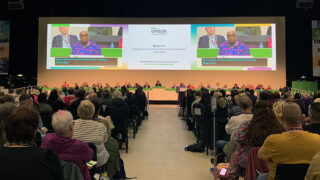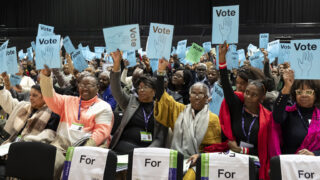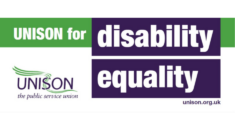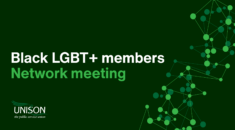A few famous faces showed up at UNISON head office recently, for an event on behalf of anti-racism charity Show Racism the Red Card.
UNISON is one of the backers of Show Racism the Red Card, and we took the chance to catch up with some of football’s greats to talk sport, public services and racism.
Rachel Yankey

Rachel Yankey plays for the England national team. She was the first woman to be registered as a professional footballer in England, and is the most capped player ever to play for England (ahead of male goalkeeper Peter Shilton). She also has an OBE.
Rachel on racism
“Show Racism the Red Card is about educating children, which I think is fantastic. I work in a primary school coaching children, so I think if you can educate children in a fun way that’s the key. Sometimes children don’t understand that terms are derogatory or how much harm they can cause.”
Rachel on public services
“When I was younger I used to go out on the street and play, but you can’t really do that any more, it’s a little bit dangerous. The world that we live in, things have changed. I think you need youth centres and leisure centres so people can be safe and play in a safe environment, so that kids can learn.”
Rachel on football
“Women’s football has always been great, it’s just only getting the publicity recently. It helps when teams do well, like when we got the bronze medal and went out in dramatic circumstances in 2015.
“I’ve just had a baby, so I don’t know if I’m going to go back to playing football or coaching at an elite level yet.”
Leroy Rosenoir

Leroy Rosenoir was a striker for Fulham, Queens Park Rangers, West Ham and other teams. He then went on to manage and coach many teams including Bristol City and Brentford.
He is one of the few Black football managers in England and spends a lot of his time combating racism.
Leroy on racism
“When I was playing, I couldn’t really deal with racism head on. It was always something that was shoved under the carpet, you just had to get on with it.
“When I had the opportunity to tell my stories and tell people how I felt, I thought Show Racism the Red Card was an excellent platform to do that. And hopefully it’s helped the organisation as well.
“I’ve gone in to thousands of schools, I’ve spoken at UNISON conferences and to other trade unions, I’ve done teacher training. I’ve been to the Houses of Parliament to chair meetings, and to lobby MPs.
“I’d like to confine racism to the history books.”
Leroy on public services
“Public services are for everybody. When people talk about not enough funding for the National Health Service, and other services not being funded enough, these are decisions.
“I travel quite a lot and realise what a great place Great Britain is. We are the envy of the whole world because of our public services, because of our National Health Service. We need to make sure that we look after it, because it’s absolutely precious.”
Curtis Fleming

Curtis Fleming has played international football and is now a coach at Queens Park Rangers. He is from Dublin and has been a patron of Show Racism the Red Card for 20 years.
Curtis on racism
“Growing up in Dublin as I did, there weren’t too many black faces. I did get a little bit of stick at school and at football matches, I got chased home a couple of times.
“I think it’s one of those experiences that you can struggle from, or you can learn from. I was really lucky I had a very strong mum, she made us very strong. I remember coming home one day and getting a bit upset at people calling me ‘Black this’ and ‘Black that’.
“And she said ‘well, you are. Those other words are wrong, but you are Black. And you’re going to be Black for the rest of your life, and if you’re proud to be Black you’ve got to stand up to it.’”
Curtis on public service workers
“Work is where you spend most of the hours of your day and it’s very important that everybody gets a fair chance to work hard, to earn a good living.”








